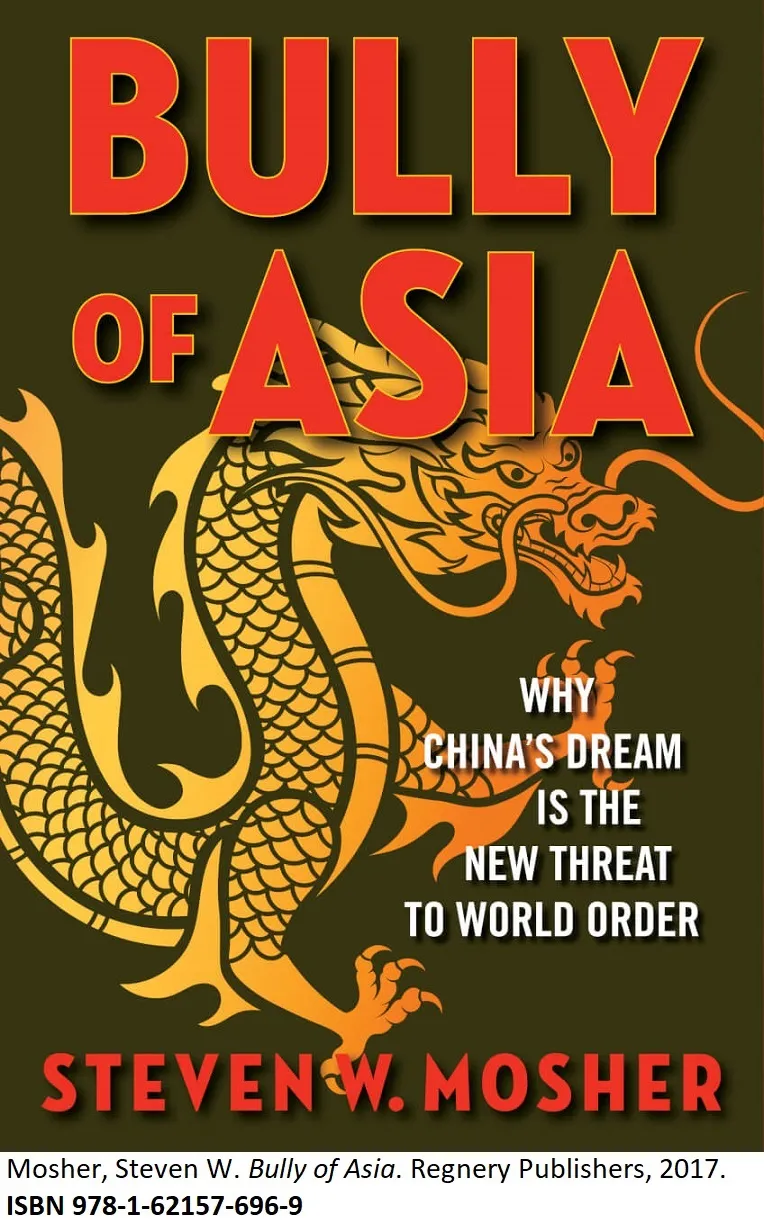Do you know that feeling you get when you have a view on a topic that is laughed at because it defies all conventional wisdom, and then you read a book by a recognized expert with a list of credentials as long as your arm that contends all the same points you've been getting laughed at for trying to make, and does it with enough sources and experience to pretty well shut down all dissent?
...Right. Well, for anyone who has followed this blog long enough to know the three main points of my opinion on China (they're evil as Hell and bent on what they believe is their "Heaven-Mandated Right" of World Domination, they're weak and would be crushed with ease if America would wake up and realize they need to be swatted, and they're playing such an elaborate game to mask those two facts that the twin illusions of benevolence and strength are rapidly becoming a strength of their own), I could basically summarize my review of Steven W. Mosher's Bully of Asia with one simple sentence: "that's the feeling I got when I was browsing through National Bookstore in Manila and opened the book jacket of this book."
Finally, Someone Gets It
Among China-apologists (Chinapologists?) and their pet wumao's there is a tired cliche that any negative view of China is either biased or formed by "not understanding China." The underlying assumption there, namely, that it is impossible to understand China and still think negatively of it, is frankly a rather shining proof of Chinese arrogance, but I digress.
Well, to channel Samuel L. Jackson for a moment, "let's leapfrog over all that bullshit." The idea that the author "doesn't understand China" is patently ludicrous. Stephen Mosher not only lived in the Chinese-speaking world for a decade (including Hong Kong both before and after the handover, which has got to provide a unique perspective), not only studied there as a graduate student (and speaks fluent Mandarin, by the way), but he was the first westerner to shed light on China's practice of forced abortions (for which he paid a hefty price, as he mentions on pages 252 & 253). It is safe to say he understands China far better than Henry Kissinger ever could.
Within the brief, 9-page prologue, Mosher lays out his thesis in plain language.
- China is bent on dominance.
- China's view of history gives rise to the belief that they are owed the world's obeisance (and I loved the fact that he used the term "Manifest Destiny" to describe this sense of entitlement).
- China's charm offensive has lulled Western academics into thinking "if we let China have a few bones, everything will be fine," which is a deadly mistake we can't afford to make.
- All of this is plainly visible to anyone who understands the euphemisms China uses.
And the author pulls no punches driving this point home. There is a brief but thorough dismissal of the current passing trend of resurrecting Cold War Era concerns over Russia (p. 3 - 6), and then Mosher gets right to business.
The role of the hegemon is firmly embedded in China's national dreamwork, intrinsic to its national identity, and profoundly implicated in its sense of national destiny.
(P. 7)
Bear this in mind if you ever decide to count how many times you hear Chinese statesmen repeating some variant of the phrase "we will never seek hegemony" without any implications of the same having been made, and two words will come to mind: "guilty conscience?" After another few pages to point out the arrogance that ancient China's regional primacy gave them in a geopolitical sense, he then goes on to thoroughly lay out centuries of proof that this egotism is not merely a side-effect of their culture but is, in fact, its very backbone, and the core tenet upon which China's entire civilization is based. Given that this is the same thing I had already been saying for quite some time, then, it is no surprise that I was hooked when I got this far into the book.
I won't take the time to go chapter-by-chapter, but let it suffice to say the book thoroughly (and mostly chronologically) exposes China's long and bloody history, never leaving in question the fact that this penchant for casual brutality without remorse, which has been the defining hallmark of Chinese statecraft for millennia, makes anything ever unleashed by any western power look mild by comparison. What lends more force to his argument is that he does not do this with only Western sources, which would leave a Chinapologist with the plausible deniability of saying "oh, that's just Western bias." No, the author frequently cites sources directly from ancient Chinese texts, using his own translation (with an explanation of unspoken connotations derived from his own extensive experience in China) rather than a white-washed one provided by the Chinese Party-State. Nothing will take the wind out of an accusation of "Western bias" faster than saying "yeah, that came from the great 'Western' thinker Sima Qian."
Another point Mosher makes that lines up with what I had already been saying prior to reading this book and have recently reiterated is China's ongoing non-kinetic war against the nation who currently occupies what they feel is their "Heaven-mandated Rightful place" at the top of the global power pyramid: the United States. While Mosher seems to have a higher estimate of China's ability to do this than I do -or rather, seems to think they are a bit closer to achieving this goal than I do- he shares my basic opinion that "we're stronger than China but that won't matter if we stay asleep," and he cites it with decades of his own work in the intelligence community, and his intimate familiarity with the fanatical assuredness the Chinese have of their own superiority
Just the Facts, Steve
Now, the book does have one Achilles' Heel, and that is that the author does not bother hiding his Right-of-Center political leanings, nor does he dress up these opinions with academic rhetoric. One might ask why this presents a problem, especially given that the one writing this review shares much of the same Right-of-Center views, but the answer is simply that it makes the Western Left, who are the ones who most desperately need to read this book and take it to heart, more likely to disregard it, as they instinctively do to anything that does not vilify Donald Trump and Ronald Reagan while singing psalms to Barack Obama. I wish the author had kept his domestic opinions muted so the book's brilliant grasp of geopolitics would have been better received by those who need it the most: those who don't share those opinions.
There is also the somewhat cringe-inducing fact that several of the footnotes at the back of the book do not include a citation of a given statement, but merely another statement or in some cases even a reaffirmation of the same statement to which they are attached. This, thankfully, is rare.
In summary, I cannot stress enough that as China reaches its slimy tentacles into everything from Hollywood to Harvard to African mines to Central Asian oil pipelines, everyone and I do mean EVERYONE, everywhere on the planet, should read this book and take it to heart. 293 pages (plus the previously mentioned 9 page introduction) with more than 50 pages of footnotes may seem daunting, but it is well worth it. If you want to understand what China is about, skip Xi Jinping's nearly-500-page doorstop of a book, Governance of China (and its slightly longer sequel), and read Bully of Asia instead.


 )
)